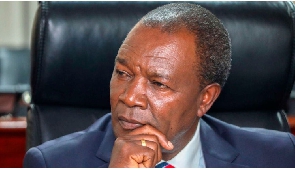 Kenya's Cabinet Secretary, National Treasury and Economic Planning Njuguna Ndung'u
Kenya's Cabinet Secretary, National Treasury and Economic Planning Njuguna Ndung'u
Interest payments on loans tapped by the state are set to rise by a record Ksh231.6 billion ($1.6 billion), even as a weak shilling forces the Treasury to inflate the size of the budget, adding to spending pressures on the Kenya Kwanza administration.
The interest payments are essentially the cost of borrowing money. The borrower makes these payments in addition to paying back the principal on a loan.
The Treasury expects interest payments in the financial year ending June 2024 to rise sharply to Ksh918.9 billion ($6.2 billion) --marking an increase of 33.7 percent from Ksh687.3 billion ($4.7 billion) -- mainly due to the weakening of the shilling.
“The increased interest payments are due to the weakening of the Kenya shilling and elevated interest rates in the domestic environment,” the Treasury said in its draft 2023 Budget Review and Outlook Paper (Brop).
A Ksh143 billion ($968.2 million) increase in interest payments in the current financial year, coupled with unspent items for the previous fiscal year, has seen the total budget expand to Ksh3.91 trillion ($26.5 billion) amidst a warning of risks by the Controller of Budget Margaret Nyakang’o.
Because a big chunk of the Kenyan debt is denominated in foreign currency, the weakening of the local currency leads to the inflation of external debt service costs with Dr Nyakang’o warning of fiscal pressure ahead.
The shilling has heavily depreciated against the dollar and exchanged for 147.26 against the greenback on Monday, having lost 19.3 percent since the start of the year when it opened at 123.42.
“The Kenya shilling has lost 19.3 percent and 19.1 percent against the dollar and euro respectively. Debt servicing costs continue to increase as the shilling weakens against the hard currencies,” said Stellar Swakei, senior research associate at Standard Investment Bank.
She noted that by June 2023 external debt had increased by approximately Ksh649.6 billion ($4.4 billion) in tandem with a 13.9 percent depreciation of the shilling since the year began.
“Definitely, interest expenses have to increase,” she said.
Interest rate payments have been rising over the past 10 years as the administration of retired president Uhuru Kenyatta came to rely on costly commercial loans to finance mega projects such as roads, railways, and ports.
Rising interest rates on domestic debt will also contribute to the increase in interest payments, with the Treasury pushing the size of the country’s budget for the financial year 2023/24 to Ksh3.91 trillion.
A big proportion of the jump in interest payments is on foreign loans which have been increased by Ksh272.5 billion ($1.84 billion), piling pressure on the country’s dwindling reserve of foreign currencies.
In the Budget estimates, the Treasury had projected to pay Ksh146.9 billion ($994.6 million) on foreign interest.
Domestic interest has been increased by Ksh18.1 billion ($122.5 million) to Ksh646.4 billion ($4.38 billion), pointing to increased borrowing costs by the government from local investors.
The spike in interest payments—a recurrent expenditure paid with taxes— piles the pressure on the administration of President William Ruto who has been forced to introduce various tax measures to narrow the budget deficit.
“The country has a significant amount of public debt denominated in foreign currencies, which makes it vulnerable to currency fluctuations and exchange rate risks,” Dr Nyakang’o said in her latest review of the national government’s expenditure for the fiscal year 2022/24.
“The continuous depreciation of the Kenya shilling will necessitate an increase in the amount required for loan repayments. This will erode the government’s fiscal space and limit the implementation of other critical policies and programs, resulting in budget adjustments,” she added.
“I have also seen there is a significant increase of external debt to be sourced in the course of this financial year which, also, partly has led to foreign interest going up,” said Mr Ogutu.
Since June 2013, interest payments have risen eight times from Ksh121.3 billion ($821.3 million) as the country went on a borrowing spree to finance mega projects such as the standard gauge railway (SGR).
The sharpest increase has been in foreign interest payments which has increased by 2,355 percent from Ksh11.1 billion ($75.2 million) in financial year 2012/13 to Ksh272.5 billion.
Besides the effect of the depreciation of the shilling, the planned increase in foreign loan uptake in the current fiscal year must also have contributed to the hike in foreign interest payments, said Churchill Ogutu, an economist at the Mauritius-based IC Group.
Net external borrowing for the current financial year has been revised upwards by 241 percent to Ksh448.7 billion ($3.03 billion) from Ksh131.5 billion ($890.3 million).
The Treasury, which insists that the bulk of the loans will be concessional financing, said this is aimed at helping to keep interest rates to the private sector low.
External obligations in the current fiscal year are also set to rise sharply with Kenya expected to make a bullet, payment of $2 billion (Ksh294.5 billion) for a maturing Eurobond in June next year amid tightening liquidity in the global financial market.